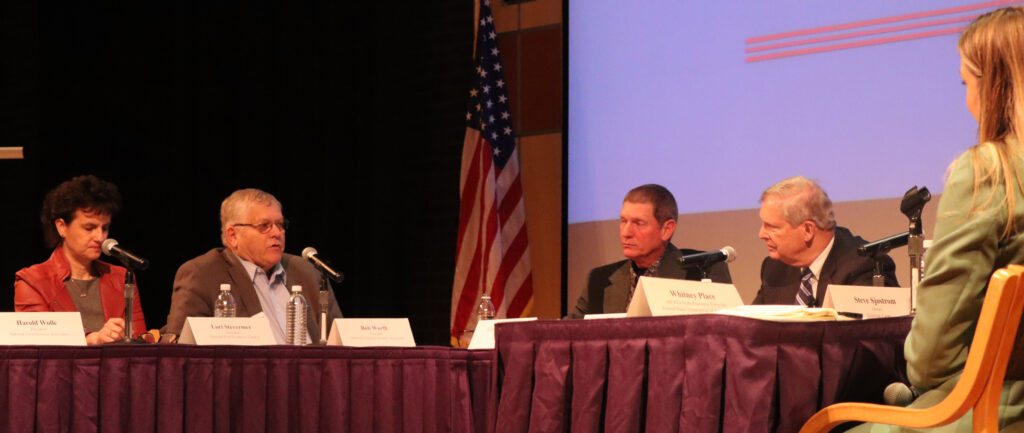The yearlong trade war with China is having a snowball effect on Minnesota farmers, Tyler soybean grower Joel Schreurs explained to legislators during Capitol Hill visits Wednesday in Washington D.C.
“The snowball is going down the hill, it’s getting bigger and out of control,” Schreurs told Rep. Jim Hagedorn during a meeting in his D.C. office. “If we don’t do something soon, we might not be able to stop it.”
Rep. Hagedorn insisted he’s relaying the plight of farmers in his district to President Trump and his administration, most recently during a limousine ride during the president’s trip to Minnesota last spring. Since the trade war began, sales to China, the largest purchaser of U.S. soybeans, dropped 75 percent from 2017 to 2018.
“The president’s trying to right wrongs that have been going on for 25 years. China’s taken jobs from us,” Hagedorn said. “But farmers are the backbone of this country and we’ll keep delivering the message. “
Farmer leaders representing American Soybean Association (ASA) and the Minnesota Soybean Growers Association (MSGA) spent the week in D.C. for ASA’s board meeting and Hill Visits. In total, farmer directors visited with all 10 of Minnesota’s federal legislative delegation in D.C.
The tone from farmers on the trade front was clear and stark: The situation is dire and urgent. Action is needed. Now.
“The trade war is killing us,” ASA Director Jim Kukowski told a legislative assistant for freshman Congressman Pete Stauber. “The MFP (Market Facilitation Program) helps but it’s a Band-Aid. We need to get something done.”

Farmers also discussed weather-related issues, the need to extend the biodiesel tax credit and advocated for infrastructure upgrades.
“What makes us more competitive over South America is our infrastructure,” said Schreuers, vice chair of the Soy Transportation Coalition. “We can’t go backwards instead of forwards.”
House Ag Chair Collin Peterson said he’s hopeful USMCA (aka the new NAFTA) will be passed, but politics are bound to play a factor with the 2020 election looming.
“It’s going to get done somehow,” Peterson said, adding that NAFTA remains in effect until USMCA is enacted or the president follows through on his threat to withdraw from the trade agreement.
Bill Gordon, ASA Vice President and a Worthington farmer, said visits to the nation’s capital give farmers a panoramic view of the current D.C. political climate.
“It’s so important to be here and communicate with both parties and see where they’re coming from,” he said. “We heard from everyone from the Trump administration to Nancy Pelosi to Collin Peterson, down to freshman representatives, and got a chance to explain how their decisions affect farmers.”
MSGA President Jamie Beyer oversaw her first D.C. Hill Visit since her election last month. She says legislators were receptive to farmers’ concerns and priorities.
“It feels like everyone knows and understands what we need,” she said.
Beyer was joined by Vice President Mike Skaug, Secretary Darin Johnson, ASA Directors Schreurs, Kukowski, Chris Hill and Kurt Krueger; ASA Young Leaders Andy and Heidi Pulk and MSGA Executive Director Joe Smentek.
“This was a good group to work with,” Beyer says. “We worked together as a team.”
O Canada
On Tuesday, after attending a trade-related breakfast with Farm Bureau, Smentek joined Beyer on their first visit to the Canadian Embassy. The two met with Christine McKee, a Canadian agriculture official, to discuss how both the U.S. and Canada would mutually benefit from USMCA. Minnesota exports $4.8 billion in goods to Canada each year, 14 percent of which is related to agriculture. The MSGA team also explained to Meyer how the Soy Innovation Campus in Crookston is primed to provide cost savings to Canada’s pork industry.
“We had a great conversation at the Canadian Embassy and look forward to continuing to dialogue with them on how the Soy Innovation Campus can help both Canada and Minnesota’s soybean growers,” Smentek said.
Beyer and Smentek then met with staff from the House Ag Committee, in advance of Wednesday’s meeting with Rep. Peterson. Trade and crop insurance were at the forefront of the meeting. The afternoon was capped by a visit to the downtown D.C. headquarters of the Ag Transportation Coalition. Increasing weight limits for trucks on Minnesota roads has long been an MSGA legislative priority, and AgTC Executive Director Peter Friedmann offered advice on how to best proceed on advocating to change those restrictions.
“Hey, if this was easy, anyone would do it,” Friedmann said as the group departed.




